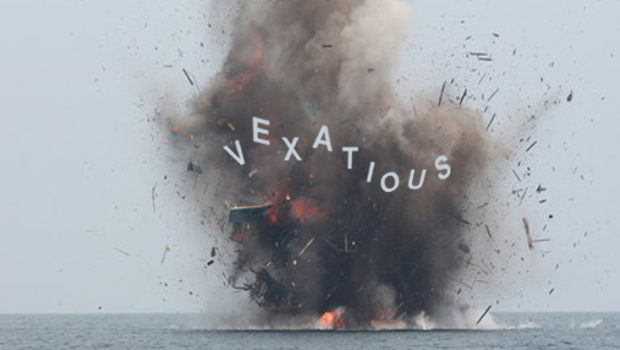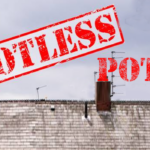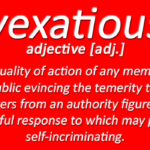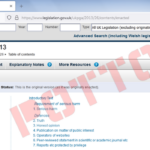POTTO’s “vexatious” claim ruled UNLAWFUL
- – an “In My View” article by NIGEL WARD, investigating the wild tactics adopted by Potto Parish Council to prevent the ‘inconvenient truths’ about its unlawful activities (ref: Tribunal) and widespread maladministration (ref: PIR) from reaching the public eye. A Tribunal Decision in June 2023 exposed and addressed several of Potto Parish Council’s nefarious tactics, which, incidentally, further substantiates why the damning July 2022 Public Interest Report was so well-founded. (All Potto articles may be reviewed here).
~~~~~
It is a core duty of all local authorities, including Potto Parish Council, to be open and transparent, especially with regard to public scrutiny. If a Council is properly managed and led, publication of its business is generally quite straightforward. Conversely, if there are irregularities and persistent problems, embarrassing elements of its business are often concealed or restricted.
It follows that the more information is ‘hidden’, the more requests there are likely to be from the public for this same inaccessible information. In extreme cases, such as at Potto Parish Council (where swathes of information have been ‘hidden’ for year upon year), very significant numbers of fully justifiable requests are likely to arise. Some of these requests may be formal FOIA requests that the Council, in theory, cannot lawfully ignore.
However, the Freedom of Information Act 2000 has an exemption clause that can be cited by a Council if it is swamped by “vexatious” or repeated requests; this is s14(1)(2) of the FOIA:

Unfortunately, the Act does not provide a definition of what constitutes “vexatious” or repeated requests. It is important to note, however, that whilst a request may be deemed “vexatious”, a requester may not. Potto Parish Council appears to have eagerly embraced this lack of definition and used it to manipulate events to its advantage. It realised that if it wittingly restricted very large amounts of information, it would encourage so many requests for that same information that it could then cite the s.14(1)exemption (above) and thereby it could entirely circumvent the intention of Parliament when the FOIA was enacted.
This is exactly what occurred in 2017 and 2018 and (amazingly) a Tribunal in 2019 upheld the s.14 exemption, meaning that the FOIA had not just been blunted, but completely nullified.
The public now had no real means, apart from via the External Auditor (which, as we have seen, can take years) and/or a tiny handful of inescapable FOIA requests, of obtaining information about the Council’s business, or of holding it to account.
The effect of this minimal public input and scrutiny from 2019 was an unfettered explosion of significant ‘weaknesses’ of Governance and Accountability at Potto Parish Council, which led directly to the damning 2022 PIR.
Auditors PKF LITTLEJOHN LLP stated in a 12-page letter, dated 21 July 2022:

and:

When I first contacted Potto Parish Council only 10 days after the PIR was issued, Chairman Councillor Andrew WILDE replied to me with two very long and detailed emails (5th August and 5th September 2022). Both of these emails endlessly repeated that the PIR was not due to any problems at Potto Parish Council, but rather it was caused by the “vexatious” behaviour of ‘one individual’ and WILDE claimed that a 2019 Tribunal verified all his claims. It did not.
However, I have since located a 2023 Tribunal Decision that effectively overturns the 2019 Tribunal; Potto Parish Council’s citing of s.14 in 2021 was found ‘unlawful’:

This Tribunal Decision encompasses 8 pages, so I shall constrain myself to the following summary of its key findings:
The title of the FOIA request that Potto Parish Council formally refused by citing the s.14 exemption is illuminating, as it emphasises the request was for ‘missing data’; i.e. information that Potto Parish Council had a legal duty to publish – but did not:

The Tribunal’s Decision (para. 7) records that the Information Commissioner (ICO) supported Potto Parish Council’s citing of s.14, by claiming that:
‘the PIR reduced the value of the request’, the requester was ‘harassing the clerk and internal auditor’, ‘further questions from the requester would add to the burden on the council’ and – preposterously – that ‘over 80% of the council’s time was spent dealing with the requester’s correspondence’.
Poppycock! I would suggest that this is a pathetically weak list of unsubstantiated whinges – each of which was subsequently dismissed by the Appeal Tribunal.
The Tribunal (para. 8) summarised the requester’s (i.e. the Appellant’s) ‘Grounds for Appeal’ against Potto Parish Council’s citing of s.14, as:
‘the Appellant’s pattern of behaviour had changed fundamentally after the 2019 Tribunal’, ‘the Council was accusing the Appellant of being vexatious, rather than the request’, the Council’s ‘submissions were factually inaccurate’, the Appellant‘disputed the Council’s allegations of harassment against the clerk and internal auditor’, the ‘external auditor had NOT found the Appellant to be vexatious, as it had the power to do’, information requests ‘were justified because of maladministration at Potto Parish Council, as supported by the PIR’s identification of weaknesses of governance and accountability across multiple heads’, there was ‘no burden on the Council as it had a duty to make that information available’andPotto Parish Council ‘had issued“corrupted and libelous publicity” about the Appellant’.
In my view, this amounts to a rather damning list of serious “procedural improprieties”, none of which were refuted or even called into question by the Tribunal.
The evidence in the Tribunal’s ‘open bundle’ totalled 279 pages – a significant amount; indicating the extent of the free input of all parties and, hence, the diligence and thoroughness of the Tribunal’s conclusions:

The Tribunal found (para. 23) that the request “was not burdensome”.
Tribunal Judge C.L. GOODMAN stated (para. 26):
“There was no evidence to support the Parish Council’s claim that it was spending over 80% of its time dealing with the Appellant’s emails and the Tribunal found this highly unlikely, given the low level of correspondence”.
This effectively dismissed Potto Parish Council’s claims as being malicious misinformation, which, whilst accepted unchallenged by the ICO, did not pass the more diligent scrutiny of the Appeals Tribunal.
The Tribunal unanimously found that the Appellant had a serious purpose for the request; para. 30 states:

The Tribunal had therefore carefully scrutinised, diligently assessed and then comprehensively dismissed ALL of Potto Parish Council’s arguments for citing s.14.
In its conclusion, the Tribunal unanimously Allowed the Appeal and recorded this Decision, overturning the previous one:

The matter of the ICO not challenging Potto Parish Council’s misinformation and then supporting it with an ‘unlawful’ Decision Notice is an ‘outcome’ for which, I would suggest, the ICO should hang its head in corporate shame; this, however, is beyond the scope of the present article.
However, as the Tribunal had determined that the ICO Decision Notice was “not in accordance with the law”, it did issue a Substitute Decision Notice:

Regular readers of my Potto series of articles may by now have guessed how Potto Parish Council handled the Appeal Tribunal’s Decision – it was censored.
The Appeal Tribunal’s Substitute Decision Notice is dated 6th June 202. It was issued to parties on 7th June 2023.
Potto Parish Council’s Agenda for the June meeting, dated 12th June 2023, for the meeting to be held 20th June 2023, did NOT record the Court’s Decision (or the Substitute Decision Notice) as correspondence, nor were these important statutory matters stated anywhere as Items of Business – and, disgracefully, nor did they appear on the July agenda.
Thus, the Court’s rulings have been concealed from Councillors and members of the public. It would not be unreasonable to apply the term ‘censored’.
The draft Minutes of the June meeting are also silenton the subject of the Court’s Substitute Decision Notice.
Potto Parish Council’s desire to hide all ‘difficult’ details from the wider public (I exclude those enlightened people who read the Enquirer) remains steadfast. The ‘directing minds’ behind Potto Parish Council appear to be a law unto themselves. For the moment.
Finally, the 35-day period granted by the Court for Potto Parish Council to issue a ‘fresh response’ expired on 12th July – Potto Parish Council has still failed to respond to the requester. The requested information continues to be withheld. The Council is now in Contempt of the Tribunal’s Substitute Decision Notice – and being in Contempt of Court is a very serious Criminal matter. I understand the requester is now taking appropriate enforcement action.
I do not intend to disappoint readers who are keen to read about the consequences of Potto Parish Council’s witting and wilful criminality.











![Potto Nepocracy [Pt.2]](http://nyenquirer.uk/wp-content/uploads/2023/03/POTTO_CANDLE-150x150.png)
![Potto: “Where’s the Money?” [Pt.4]](http://nyenquirer.uk/wp-content/uploads/2023/03/POTTO_RECORDS-150x150.png)















Comments are closed.